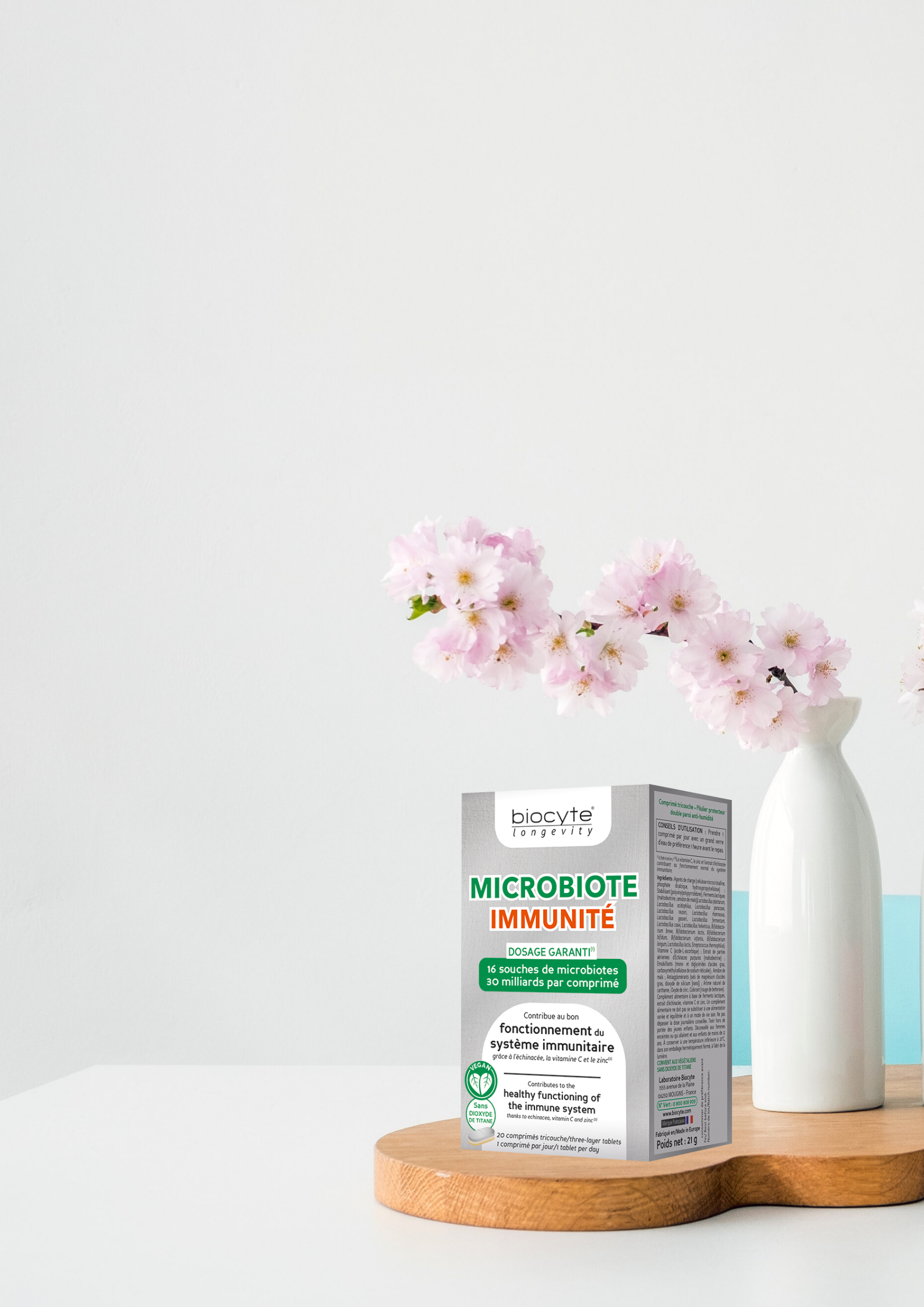
How can the intestinal microbiota prevent allergies?
Whether seasonal or persistent, 20 to 30% of French people suffer from allergies each year. These figures continue to increase each year, and the WHO (World Health Organization) estimates that by 2050, 50% of the population will be affected by allergic diseases, affecting the quality of life of many affected individuals.
The intestinal microbiota is the collection of microorganisms found in our digestive tract. This intestinal flora plays a key role in immunity. Scientists are now able to explore the link between microbiota and immunity to provide insight into allergy symptoms.
When the immune system goes into overdrive
An allergic reaction results in the body becoming hypersensitive. The immune system overreacts to a stimulus that isn't harmful to our body. Let's take a closer look at how an allergic response occurs within our body.
When our body first comes into contact with a perceived threat, such as pollen, the immune system goes into overdrive and produces a large number of antibodies. These antibodies will then build up on the body's natural barriers, the skin and mucous membranes, to prevent the stimuli from entering the body. An immune barrier is formed to protect the body from a potential threat.
The annoying thing is that this immune phenomenon releases histamine, the main substance responsible for clinical signs such as eczema, redness, or even nasal obstructions. This is when we have to get out our tissues or control the itching. Note that in a non-allergic person, the presence of pollen does not trigger any reaction, so why does this reaction only occur in some people? The immune system is simply less tolerant, it becomes stricter and triggers disproportionate defense reactions.
We've been seeing a boom in allergies for several years. Why are there such predictions from the World Health Organization, where 1 in 2 people are prone to allergic reactions? Because certain environmental factors promote or trigger our sensitivity, such as global warming, which lengthens the pollination period, while our immune system weakens due to often unbalanced diets.
The richness of the intestinal flora
The stomach is our second brain. This phrase, heard at least once by everyone, has made our intestinal flora famous. Our intestines are colonized by several billion microorganisms weighing more than 2 kilos and which play essential roles in metabolic, digestive, and immune functions.
Our digestive tract is colonized from the first moments of life with the mother's microbiota, which is partly transmitted during childbirth. It then evolves according to different life experiences and dietary differentiation. Everyone therefore has their own intestinal microbiota made up of approximately 160 different species, which evolve according to each person's lifestyle habits. Obviously, some species are common to all, such as Lactobacillus acidophilus or Bifidobacterium bifidum.
Dysbiosis occurs when the proportions of different microbiota strains are no longer optimal. Stress or an unbalanced diet are factors that can cause this condition.
A close link between microbiota and allergic response
For many years, links have been established between the microbial symbiosis of our flora and certain diseases. More recently, researchers have looked into the question of allergies and the possible role of our second brain.
Immunity is the set of our body's defensive reactions to an attack. However, sometimes this system goes into overdrive and overreacts when it shouldn't, as in the case of an allergy. Allergies are therefore triggered by a failing immune system, almost as if it could no longer tolerate anyone.
Our microbiota plays two very important roles in immunity. First, it acts as a protective barrier, making the intestine impermeable. As a result, "bad" bacteria cannot pass through and spread throughout the body.
The microbiota is also essential in the maturation of the immune system; it will help regulate the production of lymphocytes, the key cells in the immune response.
In a recent study published in PNAS, researchers highlighted the relationship between an altered microbiota and allergic reactions through eczema in mice. According to them, when the microbiota is dysbiotic, the intestine becomes permeable and certain bacteria can migrate, thus increasing inflammatory reactions. The work carried out by these researchers opens the way to new therapeutic avenues, with the key to rebalancing the intestinal flora.
Probiotics for immunity
Probiotics are microorganisms present in food and can be provided by food supplements in order to nourish or rebalance the intestinal microbiota.
Microbiote Immunity is a supplement based on Vitamin C, Zinc, Echinacea and microbiota. Each tablet contains 16 strains of microbiota. beneficial and more than 30 billion in manufacturing.
Biocyte's innovation: a tri-layer tablet to preserve the properties of each active ingredient. Since probiotic strains are sensitive to moisture, the pillbox contains a protective double wall.

Sources:
• INSERM
• Pascal M, Pérez-Gordo M, Caballero T et al. Microbiome and Allergic Diseases. Frontiers in Immunology. 2018; DOI=10.3389/fimmu.2018.01584
• MAVS deficiency induces gut dysbiotic microbiota conferring a pro-allergic phenotype, Emilie Plantamura et al. PNAS, September 24, 2018. DOI: 10.1073/pnas.1722372115





